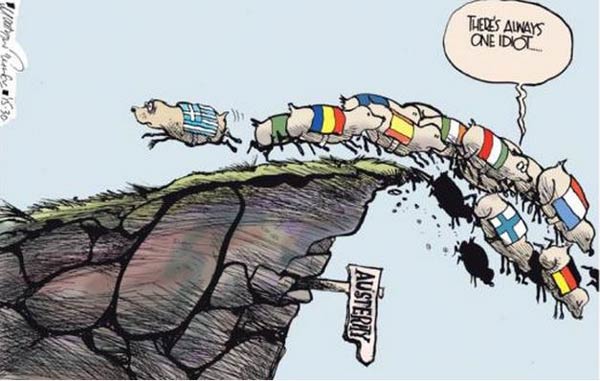Lucrezia Reichlin writes: Greece and its creditors are now enacting a deal that provides financial support in exchange for wide-ranging reforms. Although reservations about the agreement abound, political conditions did not permit a better one. But the deal can – and must – serve as the basis for saving Greece and the eurozone.
For the plan to work, Greek Prime Minister Alexis Tsipras must show real commitment to a reform program in which neither he nor many Greek citizens believe. And he must forge an alliance with Greece’s pro-European parties, because only a united government will be able to deliver.
The creditors must find the money to fund the bailout. And the International Monetary Fund must agree with the Eurogroup on how to restore debt sustainability in Greece, a precondition for the country to regain access to capital markets.
In this effort, a critical distinction must be made: though Greece has committed to deep and rapid reform, it must not be forced into hurried fiscal consolidation.
The recent agreement includes unrealistic proposals for fiscal adjustment. Before Greek banks closed and capital controls were imposed in late June, the European Commission put the primary budget deficit for this year at €4-6 billion ($4.3-6.5 billion), or 2-3% of GDP. Now, it looks like the primary deficit (which excludes interest payments) could reach 6% of GDP, with GDP falling by 4%.
Yet the new deal anticipates that Greece will make up for the year’s fiscal shortfall in just five months.
One of the key initiatives to address the fiscal shortfall is an increase in the value-added tax to 23% for almost all goods and services. VAT evasion in Greece is as high as 50%. Greece should therefore focus first on building the legal and technical infrastructure to combat tax evasion.
Despite pressure from Germany and other countries to participate in the new bailout program, the IMF will not get involved unless it judges Greece’s debt to be sustainable. That means making the economy’s debt stocks and fiscal flows consistent, with the right combination of tough but feasible fiscal targets and debt relief.
Fiscal discipline should not take priority over the important structural reforms included in the new deal, particularly measures to overhaul pensions, the legal system, product markets, public administration, and the judiciary.
The key to overcoming these challenges is for the Greek people to take ownership of the reforms, so that the public interest can prevail over vested interests.
Greek banks – which, given their huge volume of non-performing loans, are now more likely to be insolvent than illiquid – will require massive recapitalization, funded by the European Stability Mechanism, not the Greek state.
In this effort, there must be no bail-in of depositors, which would have damaging social consequences, or Greek state ownership of the banks, which would entrench clientelism in the financial system.
Greece’s humiliation in the negotiations evoked memories of the Indonesian president’s treatment by the IMF during the Asian financial crisis of 1997.
But the Greeks must put aside these emotional responses and recognize the need for many of the proposed reforms. Greece’s failure to implement them has allowed the clientelism, oligarchy, corruption, and tax evasion underpinning its economic and political dysfunction to continue practically unfettered.
The alternative is a Greek exit from the eurozone. (German Finance Minister Wolfgang Schäuble’s suggestion that Greece can just take a “time out” is a fiction.) Economists who pretend that this would be anything less than an economic and political catastrophe for Greece should look closely at the structure of Greek trade, the anemic response of exports to the already huge internal devaluation, and company and household balance sheets.
Some would welcome the damage this would do to European unity; we would not. The recent agreement is far from ideal. But Greece and its creditors must make it work.

